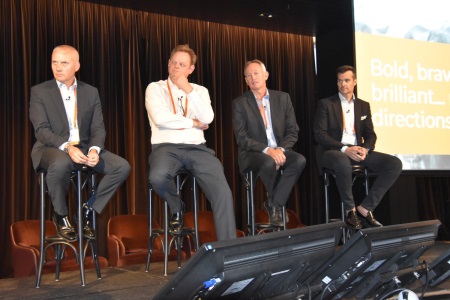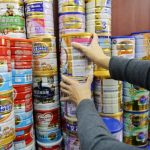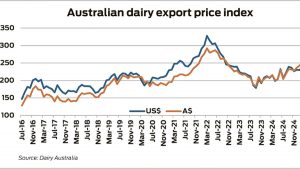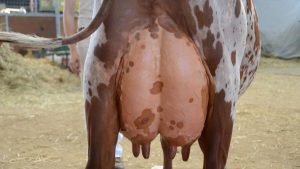
Supermarket discounted milk was in the firing line at the Australian Dairy Conference in Canberra on Thursday.
And it wasn’t farmers firing the bullets.
Chiefs from leading processors – all of which supply private-label products to supermarkets – said $1 milk and $6 cheese fundamentally undermined the value of dairy.
Saputo chairman Lino Saputo Jr, who supplies Coles with its $1 a litre milk in Victoria and NSW, said processors needed to demand the real value for dairy products when negotiating with retailers.
“I go back to the days when MG (Murray Goulburn) was running the business and they signed a contract with a large retailer for $1 milk,” he said.
“It’s hard to say this, but it doesn’t make any f*** sense.”
He applauded the move by Woolworths last week to lift its price to $1.10/l but said it still was not enough.
“$1.10 still doesn’t make sense when you can buy water at $3 a litre, when you can buy soda pop at $4 a litre or those Powerades or Gatorades at $5 a litre,” he said.
“It doesn’t make sense with all the work that’s going behind to produce milk, to process that milk to then sell it for $1 a litre.”
The processors said supermarket pricing influenced the farmgate price for milk.
Watch the panel session here
Norco chairman Greg McNamara said the Australian Competition and Consumer Commission got its findings wrong in its 2018 dairy inquiry.
The ACCC’s Dairy Inquiry Final Report said it found no evidence that supermarket pricing, including $1/l milk, had a direct impact on farmgate prices.
“Importantly, we found that contracts for the supply of private label milk allow processors to pass the farmgate price paid to farmers through to the wholesale prices they charge to retailers,” the ACCC report said.
“This means that processors do not have an incentive to reduce farmgate prices as a result of the lower wholesale prices they receive for private label milk, as the farmgate prices are passed through to the supermarkets.”
But Mr McNamara said that was wrong.
“Fundamentally the pricing mechanism and how we discuss with retailers and set pricing, their outcome was, in my view, flawed,” he said.
Mr Saputo, when asked about the current contracts providing an opportunity for more money to come back to processors for farmers, said he would “love to see that”.
Bega Cheese chief executive Paul van Heerwaarden said supermarket private label products had changed farmgate prices.
There was no longer a domestic-market farmgate price and lower export-commodity-market farmgate price.
Mr van Heerwaarden said more than half of the key dairy products – milk, cheese and butter – sold in Australian supermarkets was private label.
“And without speaking too much out of school, the baseline dairy products that go into them, whether it’s butter or milk or indeed cheese are commodity prices,” he said.
“There’s not the returns in there that there used to be.”
Mr van Heerwaarden said the supermarket label products were driven by commodity prices.
“And a lot of those products are being imported today – whether it’s from New Zealand or elsewhere,” he said.
Milk in cheap cheese and butter was valued even lower than the discounted fresh milk.
“And if we think about 10 litres of milk going into a kilogram of cheese, and a block of cheese selling for 6 bucks, that’s 60 cents a litre,” Mr van Heerwaarden said.
Mr McNamara, whose company supplies Coles with $1/l milk in south-east Queensland, said the discounted product was now also having a big impact on sales to cafes and small businesses.
More operators of franchise cafes were buying discounted milk in bulk directly from the supermarkets, rather than at a higher price through the route trade.
All agreed that the processors needed to lead the discussion with retailers about the value of milk.
“I think the single biggest issue the industry faces from my perspective when we talk about what some retailers have done in a levy and asking people to put donations in tins, I think it just devalues everything we as farmers do,” Mr McNamara said.
“We do not want a generation of welfare recipients.
“We want a generation of farmers that are business-savvy, that spend the money in the right spots and we’ve just got to help retailers actually come to that conclusion.”
Mr Saputo said the company would honour its existing contracts with retailers.
“But as those contracts expire, we like to sit at the table with those retailers and renegotiate the terms and contracts that make it mutually beneficial as opposed to one-sided,” he said.
“I think in some cases some of the contracts are one-sided.”
Mr van Heerwaarden said there was a big need for processors to properly have conversations with the retailers.
“This is the value chain we should be creating,” he said.



















